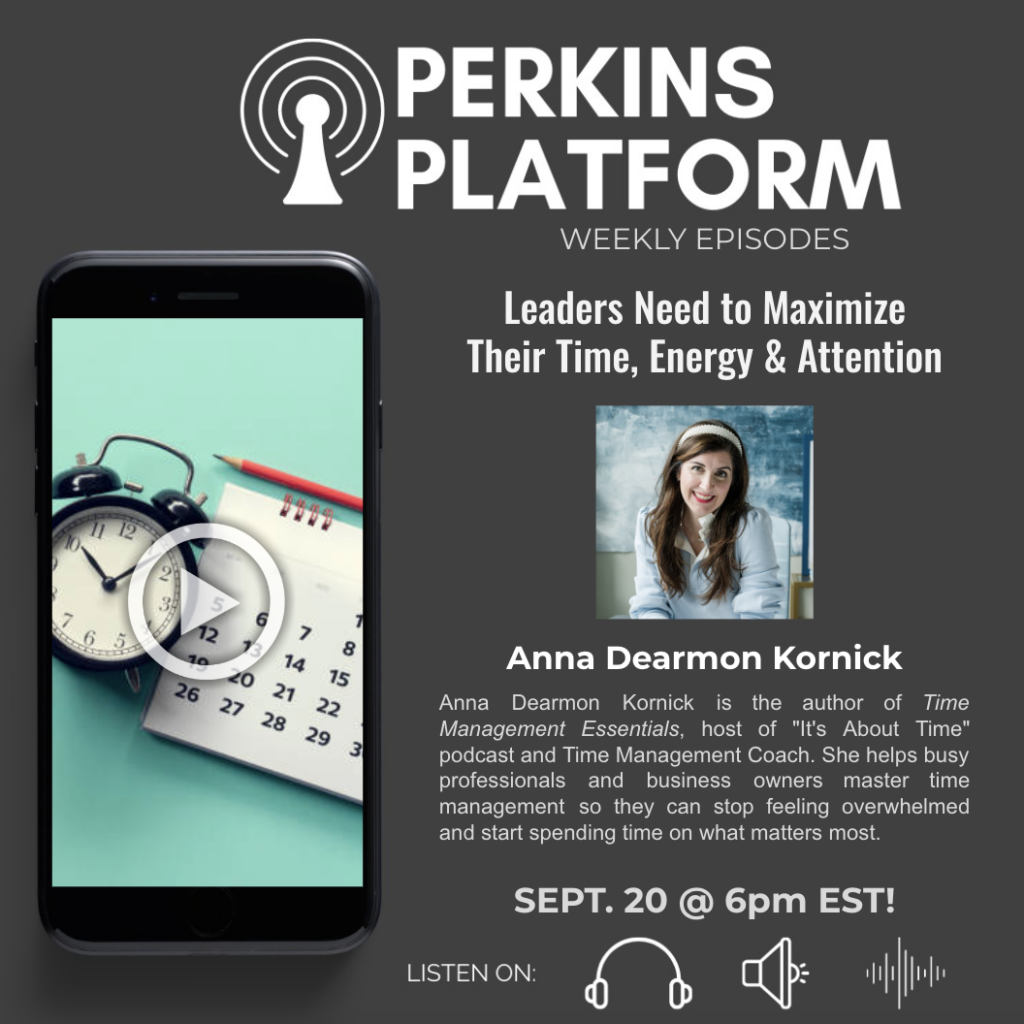When you’re leading any kind of team, the feelings of overwhelm, burnout, and distraction can be real.
You work all day to put out fires and get projects done, but you often leave feeling like you’re not sure what you actually accomplished or where your time went. Sound familiar? On the Perkins Platform Podcast, I spoke with Dr. Brian K. Perkins about strategies for maximizing your time, energy, and attention in the workplace (but these tips are good for any situation!).
Check out the episode here, or read on for a summary.

Crush the Overwhelm
I work with professionals to help them stop being overwhelmed and start spending more time on what matters most. The first step to end the overwhelm is getting a bird’s eye view on all the different moving parts in your life.
We tend to feel overwhelmed not because of the number of hours we spend working, but because of the number of projects we’re working on. That could include managing members in your team, managing projects in your personal life, or projects at home. When we spread ourselves too thin, we end up putting in a minimal amount into a large number of projects… which means we see a minimal amount of progress. This causes us to feel like we’re spinning our wheels because we don’t see the impact of all the work we’re doing.
So, when you’re feeling overwhelmed, your first step should be to get a bird’s eye view of all your projects – everything going on in your life. From there, rank what projects are most important based on your vision for the future, your values (or your company’s values), and your goals for the season. This will give you an indication of which projects to keep and which ones to drop or rearrange.
Because good time management doesn’t start in your calendar; it starts by getting clear on what matters most to you, and you’ll find that in your values and values. Unsure where to start? Try creating a vision board, and include your word of the year in it!
Maximize your Energy
There are a few different ways to think about managing your energy. In Time Management Essentials, I talk about two different perspectives: your natural energy levels, and what types of work give you energy vs. which types drain you.
What’s your daily energy rhythm?
We all have energy ebbs and flows in the day. At some points of the day, you may normally feel energized; whereas at others, you feel drained. If you can zero in on the times of day when you feel your energy peak and you plan your most critical tasks for that time of day, you’ll be able to work faster and bring your best self to your most important work.
What type of work gives you energy?
When I do podcast interviews, that’s an activity that gives me energy! I walk away from interviews feeling amazing. But invoicing and administrative work? That leaves me completely drained and bogged down.
When you can identify what activities throughout your day energize you vs. the ones that drain you, you can be strategic about when you schedule those activities throughout the week so you’re more productive.
Manage your Attention
Do you face unpredictable days with constant interruptions in your workplace? Here are my best tips to maximize your attention at work:
- Clear your environment. Keep your physical and digital environment clear of clutter. That means a clean desk as well as an organized desktop.
- Have a system to manage yourself. How many times have you sat down at your desk to start a big project, only to suddenly remember you have to buy an anniversary gift for your spouse, or order toilet paper? Sometimes we are our biggest distractions! I recommend trying a Shiny Things list if this sounds like you.
- Have clear boundaries. When you’re constantly responsive in your work and don’t have boundaries, you’re setting yourself up to constantly be reactive, which will make you feel spread too thin. To be more proactive, set up recurring one-on-one time with your team members each week. That cuts back on the number of surprise meetings you have throughout the week.
- Have buffer time in your schedule. You can’t prevent all surprises or emergencies, though. Allow for buffer time to counteract this. I recommend one day a week where you don’t have anything planned – because inevitably, something always comes up.
Want more? Listen to the full episode here.
Be the first to comment